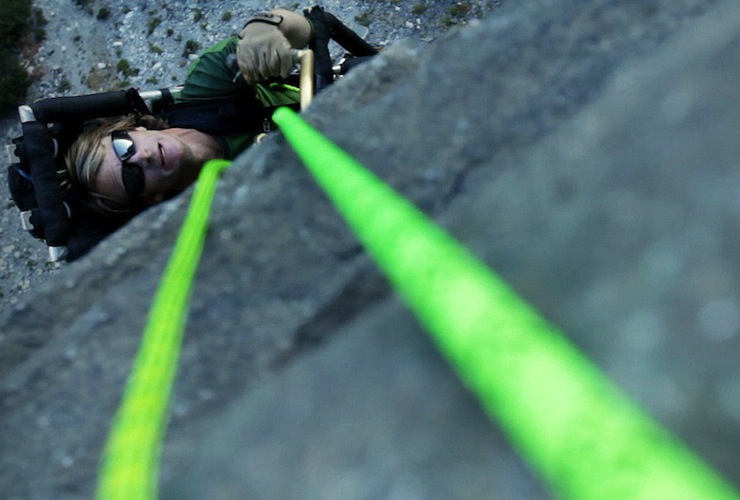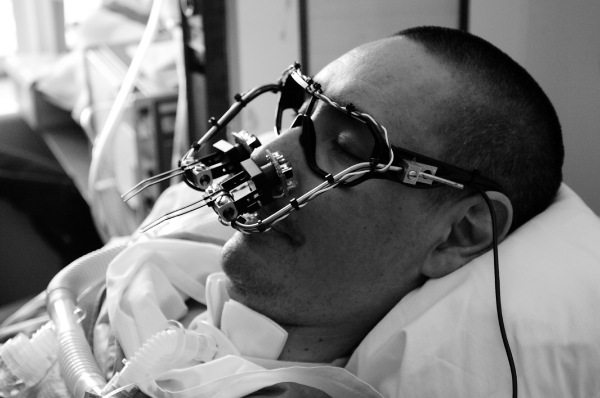Film Review: Two Amazing Stories of Triumph at this Year’s Reelabilities Film Festival
Hidden among the screenings at this year’s Reelabilities: Boston Disabilities Film Festival are two strong tales of individuals overcoming incredible odds.
Reelabilities: Boston Disabilities Film Festival, at various venues. (Check the website for films, times, and location of screenings), January 30 through February 6
By Tim Jackson
Wampler’s Ascent
Friday, January 31 at 11:30 a.m.
Cardinal Cushing Centers, 405 Washington St, Hanover, MA
Free
Buried among the Reelabilities: Boston Disabilities Film Festival screenings is the story of Steve Wampler, born with Cerebral Palsy, who commits to rappelling the face of the 3,000 foot granite monolith known as El Capitan in Yosemite National Park. It would make him the first person with a disability to accomplish such a feat.
The film serves as a fundraising tool on behalf of the Wampler Foundation, which provides wilderness experiences to physically disabled children nationwide. But it is also a moving, well-told story, a celebration of a truly remarkable exhibition of will power and physical endurance. Wampler was accompanied by two experienced guides — Tommy Thompson and David Lane — in his dizzying 6 day ascent, which required Wampler to pull up, inch-by-inch, a custom-made climbing chair (the equivalent of some 20,000 pull ups). The nimble camerawork by cinematographer Corey Rich jumps from the vast expanses of the cliff face and park landscapes to close-ups of Wampler as he pushes his body past cramps, hypothermia, and delirium from exhaustion. All the while the climb is being followed on Facebook and watched by crowds on the ground.
Wampler kept daily communication by walkie-talkie with his understandably nervous wife, who directed the film, and two beautiful, able-bodied children. The film cuts nicely between the suspense generated by the ascension and an examination of Wampler’s upbringing and family life. His outdoor heroics are amazing, but the film’s most helpful achievement may be to show the enlightened way in which Wampler was raised. The nurturing strengths of his family are inspirational. Childhood friend and climber Ben Mullin declares: “He almost had us convinced that it was funner (sic) to be in a wheelchair. Whenever he wasn’t in it, one of us was. Basically convincing us of how cool it was to be in a wheelchair.” Wampler’s life-changing experiences at a summer camp for kids with physical disabilities not only led him to save the camp from closing, but encouraged him to start a foundation dedicated to supporting similar programs designed to promote independence, responsibility and self-confidence among handicapped youth.
Wampler’s Ascent is not a perfect film, but it has a great deal to offer. Elizabeth Wampler puts the educational value of this story well: “Ignorance among people without disabilities is 100% understandable. I think we are dealing with an incredibly compassionate population of American people on the whole, but people without disabilities are scared to do it wrong.” This documentary does it right.
The screening will be followed by a panel discussion featuring Adam Combs, Waypoint Adventure; Bonnie Dennis, adaptive climber; Erik Kondo, adaptive athlete. There will be a post-screening climb for members of the Cardinal Cushing community — facilitated by Waypoint Adventure.
Getting Up: The Tempt One Story
Tuesday February 4th
Cambridge Public Library, Cambridge, MA, 6 p.m.
Free
ALS, commonly known as Lou Gehrig’s disease, afflicts the motor neurons that control voluntary muscle activity, leaving the body immobile though the brain remains active. In 2006, local filmmakers Jeanne Jordan and Steve Ascher documented the astounding efforts by the family of Stephen Heywood to find a cure for the disease in So Much So Fast. Heywood tragically died on November 26 of that year. Now, after its Slamdance festival premiere, comes Getting Up: The Tempt One Story, another tale that dramatizes an unbelievable triumph of spirit over adversity through the use of creativity and technology.
Tony “Tempt One” Quan was struck with the disease at the age of 34. At the time he was one of the leading graffiti artists and social activists in Los Angeles, excelling at a design approach that combined a Latino (or Cholo) style with New York graffiti influences. The artists in Los Angeles are diverse, and often at odds. The film starts out deep in the underground culture and cliques that make up this marginalized world. But when Tempt One is struck down and becomes bedridden, the story expands. Mick Ebeling, a socially conscious designer, animator, and innovator hears about Tempt One’s plight. Ebeling’s respect for the the artist’s vision and talent combined with the dedication of a community of artists committed to keeping Tempt One active. Thus begins a journey into the power of some mind-blowing technological developments. With a free thinking group of designers and artists, some input from Dell Computer, and the help of Open Source software, Ebeling creates the EyeWriter, which allows a paralyzed patient to draw and communicate using only the eyes.
The documentary, directed by Caskey Eberling, moves from the artists and streets of L.A. to the dedicated work of free-thinking young scientists, programmers, and geniuses from around the world, including the people at the Graffiti Research Lab, which invents new tools and technologies friendly to graffiti, such as machines that can help put laser writing on distant walls. At the center of it all is the astounding resilience and endurance of Tempt One who, while physically immobile, can use his eyes to speak, create, draw, and eventually bring communities of disparate artists together. The Boston screening will include a panel with graffiti historian Calab Neelon.
Tim Jackson is an assistant professor at the New England Institute of Art in the Digital Film and Video Department. His music career in Boston began in the 1970s and includes some 20 groups, many recordings, national and international tours, and contributions to film soundtracks. He studied theater and English as an undergraduate and has also has worked helter skelter as an actor and member of SAG and AFTRA since the 1980s. He has directed two documentaries: Chaos and Order: Making American Theater about the American Repertory Theater, and Radical Jesters, which profiles the practices of 11 interventionist artists and agit-prop performance groups. He is currently finishing a third documentary, When Things Go Wrong, about the Boston singer/songwriter Robin Lane, with whom he has worked for 30 years. You can read more of his work on his blog.


